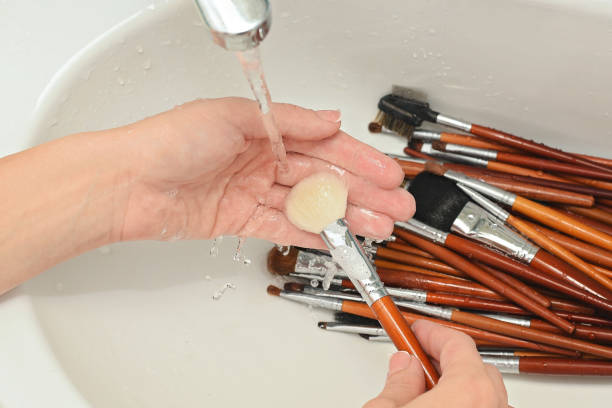+86 198 0337 5938
+86 198 0337 5938
When was the last time you cleaned your makeup brushes? This seemingly small habit has a significant impact on your skin's health. Makeup brushes come into frequent contact with your skin, makeup products, and the surrounding environment, making them a prime location for bacterial growth. But what bacteria can thrive on your brushes, and what are the consequences for your health? This article explores these questions, supported by authoritative studies, and provides actionable tips to keep your brushes—and your skin—clean and healthy.
The way you use and store makeup brushes plays a crucial role in bacterial growth. Common behaviors that contribute to contamination include:
Infrequent Cleaning: According to a 2019 study published in the Journal of Applied Microbiology, more than 70% of makeup users clean their brushes less than once a month, leading to significant bacterial buildup.
Moist Environments: Storing brushes in damp places or using them with liquid-based products creates an ideal breeding ground for bacteria.
Skin Contact and Dead Cells: Brushes pick up oils, dead skin cells, and sweat, which provide nutrients for bacteria.
Sharing Brushes: Sharing makeup brushes increases the risk of cross-contamination with other people's skin bacteria.

Research has identified several types of bacteria and pathogens commonly found on makeup brushes:
Staphylococcus aureus: Found in 34% of tested brushes in a study by the American Society for Microbiology (2020), this bacterium can cause infections, boils, and even cellulitis if introduced into open wounds.
Escherichia coli (E. coli): Linked to poor hygiene practices, E. coli on brushes can result in gastrointestinal and skin infections (Journal of Clinical Microbiology, 2018).
Pseudomonas aeruginosa: Frequently found in damp brushes, this bacterium can cause severe skin infections, especially in individuals with compromised immune systems (Clinical Infectious Diseases, 2019).
Candida albicans: Makeup brushes contaminated with this yeast can exacerbate fungal infections, including oral thrush and skin candidiasis (Mycological Research, 2020).
Using contaminated makeup brushes can lead to a variety of skin and systemic issues:
Acne and Breakouts: Bacteria like Staphylococcus aureus can clog pores and worsen acne.
Skin Infections: Conditions such as folliculitis and impetigo can arise from repeated exposure to harmful microbes.
Eye Infections: Brushes used near the eyes can transfer bacteria like Pseudomonas, causing conjunctivitis or styes.
Allergic Reactions: Bacterial byproducts can irritate sensitive skin, leading to redness, swelling, or rashes.
Systemic Infections: In severe cases, bacteria like E. coli can enter the bloodstream through small cuts or abrasions, leading to life-threatening infections.
Frequency: Clean brushes used for liquid products weekly, while powder brushes can be cleaned every two weeks.
Methods: Use a gentle brush cleanser or a mix of warm water and mild soap. Ensure thorough rinsing to remove residue.
Isopropyl Alcohol: Spraying brushes with 70% isopropyl alcohol after each use significantly reduces bacterial load (Dermatology Research and Practice, 2019).
UV Sterilizers: Studies have shown that UV-C light effectively kills up to 99.9% of bacteria on makeup brushes (Journal of Photochemistry and Photobiology, 2020).
Avoid Damp Environments: Store brushes in a dry, well-ventilated area to prevent the growth of moisture-loving bacteria.
Individual Cases: Use protective brush cases to minimize exposure to dust and airborne microbes.
Even with proper cleaning, brushes degrade over time and become harder to sanitize effectively. Replace brushes every 6 to 12 months, depending on usage.
Makeup brushes are essential tools in achieving flawless makeup looks, but their hygiene should never be overlooked. Unclean brushes harbor a range of bacteria, including Staphylococcus aureus and E. coli, which can lead to severe skin and health issues. By adopting regular cleaning routines, using disinfectants, and storing brushes properly, you can significantly reduce bacterial growth and protect your skin's health.
Keeping your makeup brushes clean is not just a beauty routine—it's a vital step in maintaining overall skin wellness.
So, next time you pick up a brush, remember: a clean brush is the foundation of healthy skin.
References
Journal of Applied Microbiology, 2019
American Society for Microbiology, 2020
Journal of Clinical Microbiology, 2018
Clinical Infectious Diseases, 2019
Mycological Research, 2020
Dermatology Research and Practice, 2019
Journal of Photochemistry and Photobiology, 2020
Contact Us
Related Keywords
Denim CollectionConnections and Differences Between Makeup BrushesLooking for High-Quality Makeup Brush Manufacturers? Don’t Miss GREEN BRUSH!The Process of Custom Your makeup brushesTop Materials for Custom Makeup Brush Handles in 2024The Great Ferrule Face-Off: Brass vs. Aluminum in Makeup BrushesA Guide to Makeup Brushes with Names and UsesHow to Create Your Private Label Makeup BrushGREEN BRUSH: Private Label Makeup Brushes WholesaleSafe and Fun Makeup Brushes for Kids: What to Look ForNylon Makeup Brushes - A Sustainable Choice for the Eco-Conscious Beauty EnthusiastCangzhou, Hebei: World's Largest Handmade Makeup Brush Production HubThe Best Way to Dry Your Makeup BrushesGREEN BRUSH: FSC Cosmetic Brush ManufacturerFoundation Brush vs. Powder Brush: What's the Difference?What Factors Affect the Price of Makeup Brushes?What Kind of Loose Powder Brush Is Suitable for Different Face Shapes?Cultural Influences on Makeup Brushes: Design and Regional PreferencesHow Makeup Brush Sizes Are Defined: A Look Into Industry StandardsConsumer Behavior: Why Are Custom Makeup Brushes So Attractive?What Bacteria Grows on Makeup Brushes?Private Label Makeup Brushes WholesaleChina Round Powder Brush WholesaleGlobal Makeup Brush Market Status and Future Analysis Report (2025)How often should concealer brushes be cleaned?How OEM Makeup Brush Services Help Beauty Startups Grow FasterProfessional Makeup Brush Guide: Expert-Recommended Brush SetsWhy are high-quality makeup brush OEM factories more reliable in terms of delivery time?Leave a Message
